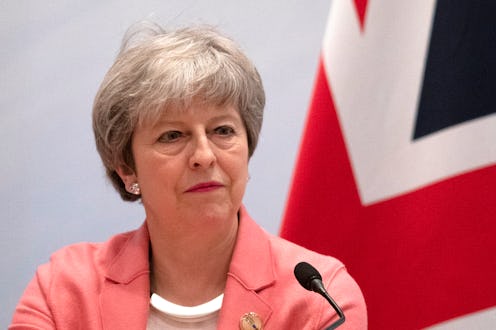News
Experts Think Extending Article 50 Could Have These Consequences For The Economy

As the deadline for Brexit looms, it's understandable to feel slightly apprehensive in regards to the eventual outcome. Once more, there's still the possibility that the limbo that the UK has been for three years could be extended further if negotiations continue past the deadline date. So what happens if Article 50 is extended?
As the Guardian reports, during an EU summit in Egypt on Monday (Feb. 25), president of the European Council Donald Tusk made it clear that as "there's no majority in the House of Commons to approve a deal," May must choose between "a chaotic Brexit or an extension." He also made it clear that this ultimatum is "not our intention or plan, but an objective fact." Basically, when the deadline for Article 50 inevitably rolls around on Mar. 29, May will have to choose between extending the negotiation further or deal with the consequences of a "chaotic Brexit."
But according to Tusk, it seems as though the prime minister "still believes she will be able to avoid this scenario," also suggesting that May "had been resistant to a delay in a meeting with [Tusk] earlier in the gathering," according to the Guardian. And judging by her comments in a separate press conference during the summit, it seems as though an extension is not the desired outcome. "An extension to Article 50, a delay in this process, doesn't deliver a decision in parliament, it doesn't deliver a deal," she explained. "All it does is precisely what the word 'delay' says. Any extension of Article 50 isn't addressing the issues."
She continued:
"We have it within our grasp. I've had a real sense from the meeting I've had here and the conversations I've had in recent days that we can achieve a deal. It's within our grasp to leave with a deal on 29 March and that's where all of my energies are going to be focused."
While that sounds optimistic, the prospect of Article 50 being extended seems more than inevitable. While an amendment put forth by Labour MP Yvette Cooper to delay the Brexit vote was defeated last month, the Telegraph reports that it "will be considered again this week," with supporters stating to the newspaper that it's pretty much a "done deal" at this point.
As the Telegraph points out, for Article 50 to be extended there will either have to be a vote of no confidence in the Commons resulting in a general election, a second referendum, or simply time running out for a deal to be made by the Mar. 29. Whatever the scenario, the prime minister has to "formally ask European leaders for the Article 50 process to be extended, with the EU27 then unanimously agreeing to her request," the publication reports.
But what will the consequences of an extension hold? Well, it actually doesn't look as concerning as you may have thought. While it will result in an extended amount of limbo regarding whether the UK is staying or leaving the EU, an extension on Article 50 could actually benefit the economy. As the Telegraph reports, if Article 50 is indeed extended it's "reasonable to assume that the pound would rise" as the "markets have tended to welcome any sign of a soft, or delayed, Brexit."
There is also the possibility that homeowners "could decide to try putting their properties on the market," but may still be dismayed at the uncertainty regarding the outcome of Brexit.
Until a final decision is made, it seems that uncertainty is going to be the outcome regardless of whether Article 50 is extended or not.